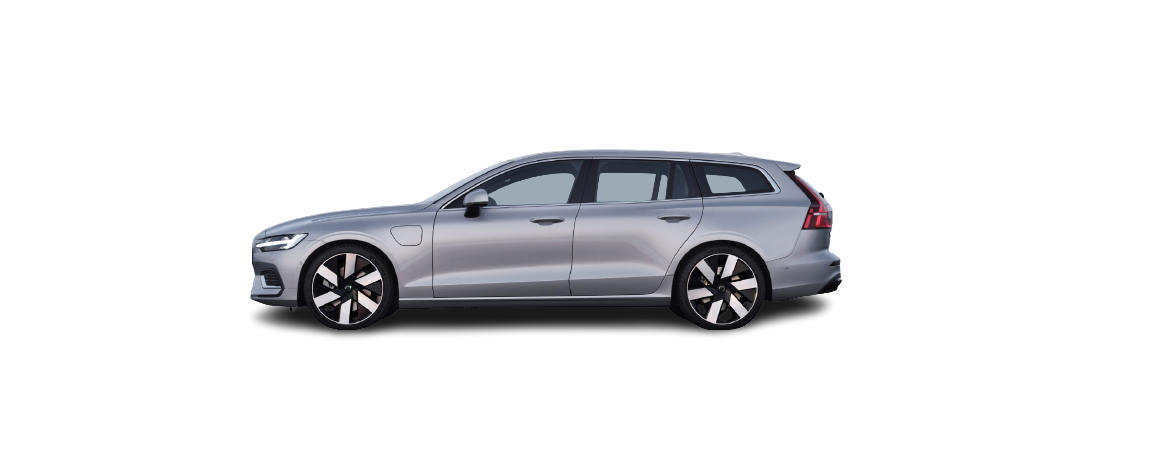Contents
hide
2023 Volvo S60 Recharge Plug-in Hybrid Locking and unlocking

Keys
The car’s physical keys are available in different variants. The car detects when a key is in the front part of the passenger compartment, and the car can then be started.
Video Player
00:00
00:00
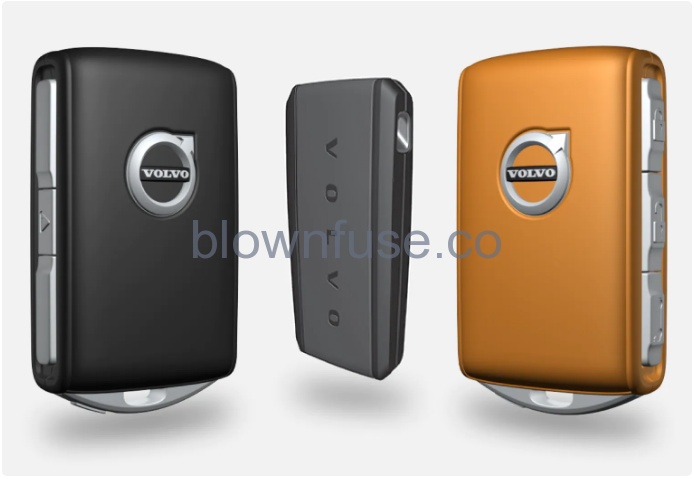
- Available key types are standard key, Key Tag, and Care Key.
- The standard key and Care Key are equipped with buttons. Additional keys to the number included as standard can be ordered. For cars equipped with keyless locking and unlocking, a slightly smaller, lighter, and button-less key (Key Tag) can be purchased as an accessory.
- To start the car, a key needs to be within the front part of the passenger compartment.
- For cars equipped with keyless locking and unlocking (Passive Entry) the key can be anywhere in the car to start the car.
- These keys can be linked to different user profiles to save personal preferences in the car.
Warning
- The key contains a button cell battery. Keep new and used batteries out of the reach of children. If someone swallows a battery it may cause serious injury.
- If damage is discovered, e.g. if the battery cover cannot be closed properly, then the product should not be used. Keep defective products out of the reach of children.
Standard key and its buttons
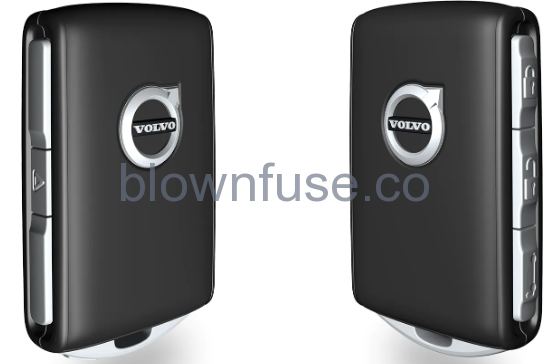 The key has four buttons – one on the left-hand side and three on the right-hand side.
The key has four buttons – one on the left-hand side and three on the right-hand side.




 The key has four buttons – one on the left-hand side and three on the right-hand side.
The key has four buttons – one on the left-hand side and three on the right-hand side.
Locking
One press on the button locks the car and arms the alarm.
One long press closes all windows as well as the panoramic roof.
Unlocking
One press on the button unlocks the car and disarms the alarm.
One long press opens all windows simultaneously. This can be used, for example, to quickly air a hot car before getting into it.
Boot lid
One press on the button disarms the alarm and unlocks the boot lid.
Panic function
The panic function is used to attract attention in an emergency. Press and hold the button for at least 3 seconds or press it twice within 3 seconds to activate the car’s direction indicators and the horn. The function can be turned off with the same button once it has been active for at least 5 seconds. Otherwise it is deactivated automatically after 3 minutes.
Warning
If anyone is left in the car, make sure the power windows and panoramic roof are de-energised by taking the key with you when you leave the car.
If anyone is left in the car, make sure the power windows and panoramic roof are de-energised by taking the key with you when you leave the car.
Note
A key that has been locked in the car is temporarily deactivated and cannot be used before the car has been unlocked using another valid key.
A key that has been locked in the car is temporarily deactivated and cannot be used before the car has been unlocked using another valid key.
Button-less key (Key Tag)
A Key Tag can be ordered as an accessory for cars equipped with the keyless locking and unlocking function. Starting and keyless locking and unlocking work in the same way as with the standard key. The key is waterproof to a depth of approx. 10 metres (30 feet) for up to 60 minutes. It does not have extending key blade, and the battery cannot be replaced.
A Key Tag can be ordered as an accessory for cars equipped with the keyless locking and unlocking function. Starting and keyless locking and unlocking work in the same way as with the standard key. The key is waterproof to a depth of approx. 10 metres (30 feet) for up to 60 minutes. It does not have extending key blade, and the battery cannot be replaced.
Care Key
Note
- The speed limit function with Care Key will be made available through a planned software update.
- You can set a speed limit that is active when the Care Key is used. The limitation is intended to encourage the car to be driven in a safe manner, e.g. when being loaned out.
If the active key is removed from the car

- If the key is removed from the car when the engine is running, the warning message, The car key is not detected. See Owner’s Manual for more information., is shown in the driver display and an acoustic reminder sounds when the last door is closed.
- The message disappears when the key is returned to the car, followed by a press of the right-hand keypad’s O button, or when all of the doors have been closed.
Interference
Key functions for keyless starting and keyless locking and unlocking can be disrupted by electromagnetic fields and screening.
Note
- Avoid storing the car’s keys close to metal objects or electronics (e.g. mobile phones, tablets, laptops or chargers). Preferably no closer than 10-15 cm (4-6 inches).
- If there is still interference – use the key’s detachable key blade to unlock. Then place the key in the back-up reader in the cup holder to disarm the alarm and allow the car to be started.
- When the key shall be read by the back-up reader, make sure that the cup holder is separate from other nearby car keys, metal objects and electronics (e.g. mobile phones, tablets, laptops or chargers). These objects may disrupt the functions.
You can use the key’s buttons to lock or unlock the whole car.

Locking with the key’s buttons
- Press the
 button to lock the car.
button to lock the car. - The driver’s door must be closed for the lock sequence to be activated. If any of the other doors or the boot lid is open, then these are not locked and their alarms armed until they are closed. The alarm’s movement detectors are activated when all the doors and the boot lid are closed and locked.
Note
A key that has been locked in the car is temporarily deactivated and cannot be used before the car has been unlocked using another valid key.
A key that has been locked in the car is temporarily deactivated and cannot be used before the car has been unlocked using another valid key.
Locking when the boot lid is open
Note
If the car has been locked while the boot lid is open, be careful not to leave the key in the cargo area when the boot lid is closed.
If the car has been locked while the boot lid is open, be careful not to leave the key in the cargo area when the boot lid is closed.
Unlocking with the key’s buttons
- Press the
 button to unlock the car.
button to unlock the car.
Automatic relocking
If none of the doors or the boot lid is opened within 2 minutes of unlocking, they are locked automatically. This function prevents the car from being left unlocked unintentionally.
If none of the doors or the boot lid is opened within 2 minutes of unlocking, they are locked automatically. This function prevents the car from being left unlocked unintentionally.
If the key is not working
If the key’s buttons stop working then its battery may be discharged – in which case, replace the battery or use the detachable key blade.
If the key’s buttons stop working then its battery may be discharged – in which case, replace the battery or use the detachable key blade.
Settings for unlocking
It is possible to select different sequences for unlocking.
- Press
 in the centre display.
in the centre display. - Press Controls.
- Select setting for unlocking.
There is a button on the key to unlock the boot lid only.
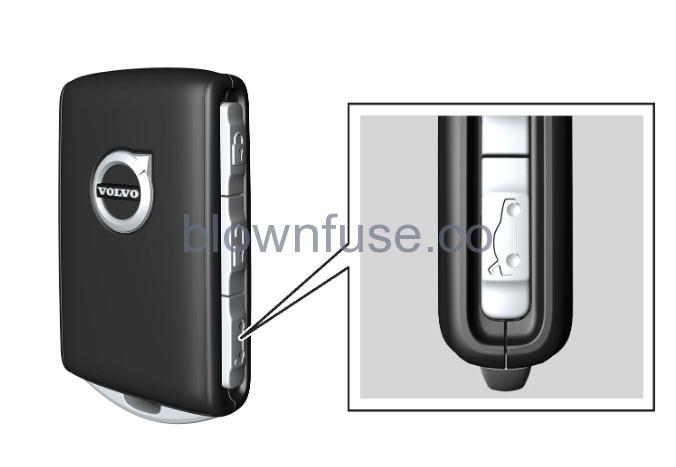
- Press the key’s
 button.
button. - The boot lid is unlocked but remains closed.
- The side doors are still locked and the alarm is armed. The lock and alarm indicator on the instrument panel extinguishes in order to show that the entire car is not locked.
- You can open the boot lid by gripping the rubberised pressure plate underneath its lower edge.
- If the boot lid is not opened within 2 minutes then it is relocked and the alarm is re-armed.
Locking and unlocking with the detachable key blade
The detachable key blade can be used to unlock one of the car’s doors from the outside – such as if the battery in the key is discharged.
Unlocking with the key blade
Note
When the door is unlocked using the key blade and is then opened, the alarm is triggered. The alarm must be deactivated manually – it may be a good idea to read that section before opening the car.
When the door is unlocked using the key blade and is then opened, the alarm is triggered. The alarm must be deactivated manually – it may be a good idea to read that section before opening the car.
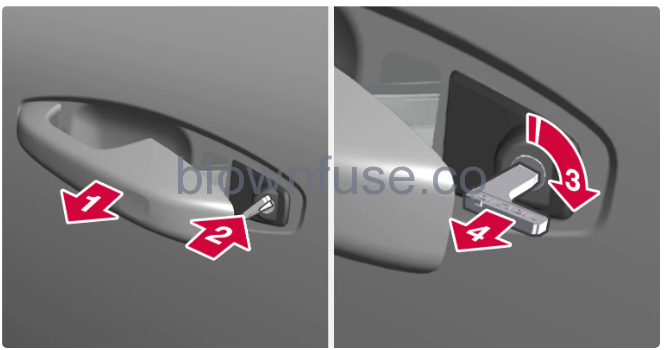
- Pull out the front door’s handle on the left-hand side of the car to its end position.
- Insert the key.
- Turn clockwise 45 degrees so that the key is pointing straight back.
- Turn the key back 45 degrees to its starting position and remove it.
>The door can be opened using the handle.
Locking with the key blade
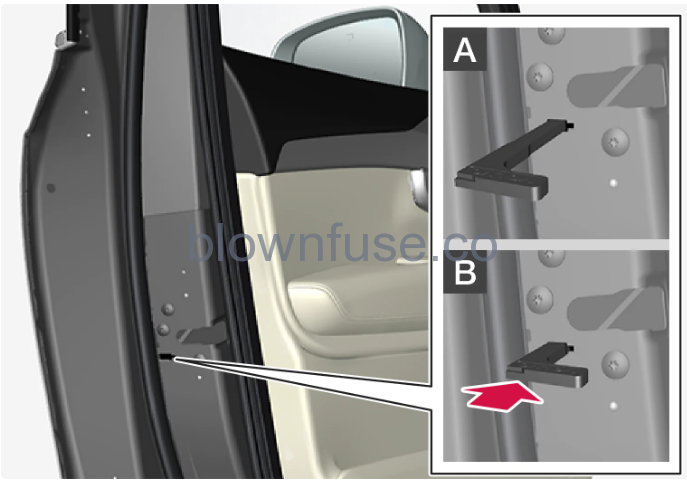 Manual locking of the door. Not to be mixed up with child locks.
Manual locking of the door. Not to be mixed up with child locks.
- The left-hand front door can be locked using the detachable key blade.
- Other doors have a lock reset on the end face that must be pressed in using the key blade. Then they are mechanically locked against opening from the outside, but can be opened from the inside.
 Manual locking of the door. Not to be mixed up with child locks.
Manual locking of the door. Not to be mixed up with child locks.
- Remove the detachable key blade from the key with buttons.
- Insert the key blade in the hole for lock reset.
- Press in the key until it bottoms – approximately 12 mm (0.5 inches).
| A | The door can be opened from both the outside and the inside. |
| B | The door is blocked against opening from the outside. To return to position A, the inner door handle must be opened. |
Note

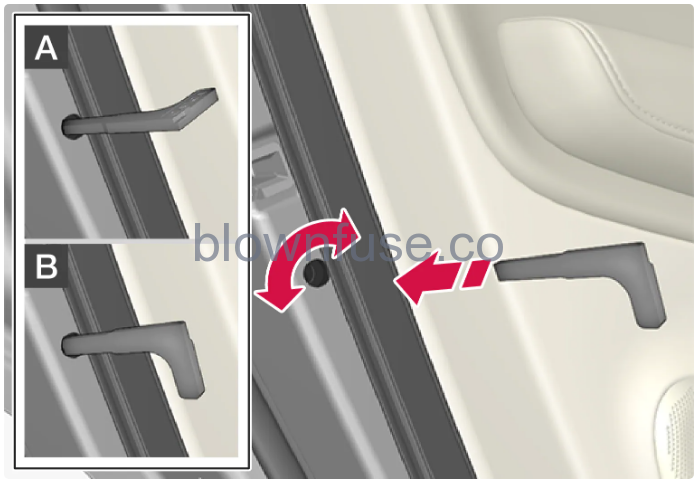
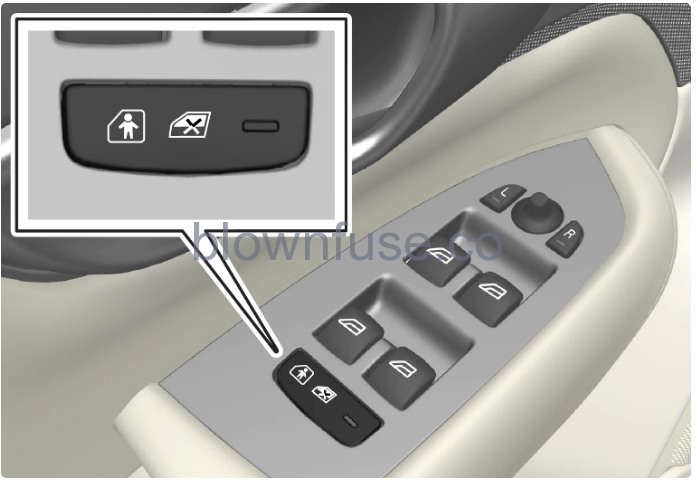 Activation and deactivation button.
Activation and deactivation button.
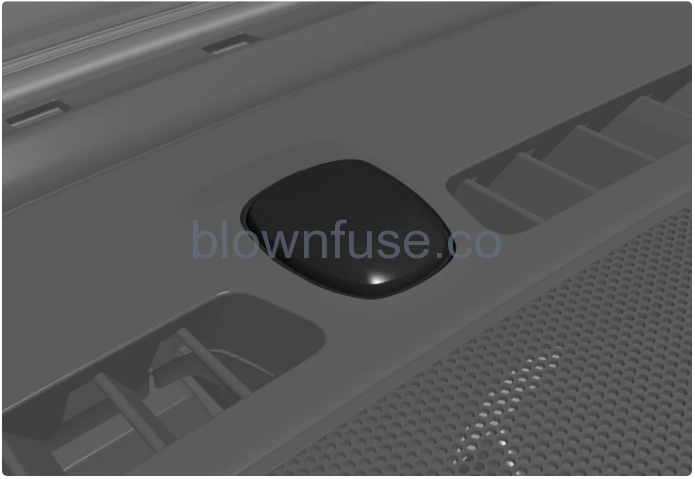
The indicator for locks and alarm is located in the centre of the instrument panel, close to the windscreen.
- A door’s lock reset only locks that particular door – not all doors simultaneously.
- A manually locked rear door with enabled child lock cannot be opened from either insider or outside. Unlocking is possible using the buttons on the key, the central locking button, the keyless locking system or by using the Volvo Cars app.
Unlocking the boot lid from the inside of the car
The boot lid can be unlocked from inside the car using a button beside the steering wheel on the instrument panel.

- Press the
 button on the instrument panel.
button on the instrument panel. - The boot lid is unlocked and can be opened from the outside.
Locking and unlocking
The car can be locked and unlocked in several different ways.
The options are:
- with the key’s buttons
- using the detachable key blade (if the battery in the key is discharged)
- keyless (the car detects that a key is within range)
- from the inside of the car with the door handles and lock buttons
- with the Volvo Cars app
- automatic locking when the car is driven.
Note
In the event of a collision, the car unlocks all doors for safety reasons. This only happens if any of the safety systems have deployed.
In the event of a collision, the car unlocks all doors for safety reasons. This only happens if any of the safety systems have deployed.
Activating and deactivating child safety locks
- The child safety lock prevents the rear doors from being opened from inside. With electric child safety locks, power window operation from the rear seat is also prevented.
- The child lock can be either manual or electrical.
Manual child lock

- Manual child lock. Not to be confused with manual door locks.
- Use the key’s detachable key blade to turn the knob.
| A | The door is blocked against opening from the inside. |
| B | The door can be opened from both the outside and the inside. |
Note
- A door’s knob control only blocks that particular door – not both rear doors simultaneously.
- Cars with an electric child safety lock do not have a manual child lock.
Electric child lock
The electric child lock can be activated and deactivated in all ignition positions above 0. Activation and deactivation can be performed up to 2 minutes after switching off the car, provided that no door is opened.
The electric child lock can be activated and deactivated in all ignition positions above 0. Activation and deactivation can be performed up to 2 minutes after switching off the car, provided that no door is opened.
 Activation and deactivation button.
Activation and deactivation button.
Rear child safety lock enabled
When the lamp in the button is illuminated, the child safety lock is enabled.
If the child lock is activated when the car is switched off, it will remain activated the next time the car is started.
When the lamp in the button is illuminated, the child safety lock is enabled.
If the child lock is activated when the car is switched off, it will remain activated the next time the car is started.
- Rear doors cannot be opened from the inside.
- Rear power windows can only be operated from the driver’s door.
Rear child safety lock disabled
When the lamp in the button is not illuminated, the child safety lock is disabled.
When the lamp in the button is not illuminated, the child safety lock is disabled.
- Rear doors can be opened from the inside and power windows operated from the rear seat.
Symbols and messages
| Symbol | Message | Specification |
|---|---|---|
 |
Rear child lock activated | The child lock is activated. |
 |
Rear child lock deactivated | The child lock is deactivated. |
Lock confirmation
When the car is locked or unlocked can be indicated in various ways. You can adjust how the car confirms locking or unlocking through the settings for lock indication and door mirrors.
Exterior indication
Locking
Locking
- The car’s hazard warning flashers indicate locking by flashing and retracting the door mirrors.
Unlocking
- The car’s hazard warning flashers indicate unlocking by two flashes and extending the door mirrors.
All doors, the boot lid and the bonnet must be closed for the car to indicate that it is locked. If locking takes place with just the driver door closed, locking will take place but the lock indication with hazard warning flashers will only take place when all doors, the boot lid and the bonnet have been closed.
Lock and alarm indicator on the instrument panel

The indicator for locks and alarm is located in the centre of the instrument panel, close to the windscreen.
The lock and alarm indicator shows the status of the locking system:
- A long flash indicates locking.
- Short flashes indicate that the car is locked.
- Rapid flashes after disarming the alarm indicating that the alarm has been triggered.
Indication in the door lock buttons
The inside of the car is equipped with lock buttons that include a lock symbol and a lock indicator lamp.
The inside of the car is equipped with lock buttons that include a lock symbol and a lock indicator lamp.

- All of the doors are locked when the indicator lamps for the front doors are illuminated. The lamps are extinguished if any car door is opened.
- The rear door indicator lamps are extinguished if a rear door is unlocked.
Other indication
Depending on the car’s settings, functions such as home safety light and guidance light, as well as automatic retraction and extension of door mirrors, can indicate locking or unlocking.
Depending on the car’s settings, functions such as home safety light and guidance light, as well as automatic retraction and extension of door mirrors, can indicate locking or unlocking.
Lock indication setting
It is possible to select various options for how the car confirms locking and unlocking in the settings menu in the centre display.
- Press
 in the centre display.
in the centre display. - Press Controls.
- Choose to activate or deactivate confirmation for locking/unlocking.
